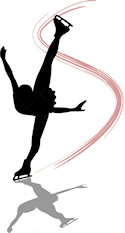Coaching Philosophy
Statement of Purpose
My goal is to promote the sport of figure skating by helping individuals achieve their maximum potential in terms of skill and competence on the ice. To succeed in this effort, I will coach with vigor and enthusiasm, providing knowledgeable instruction and discipline in a constructive manner that ensures an enjoyable educational experience and endows the skater with physical and emotional benefits for a lifetime.
Ongoing education in the sport of skating is a must to constantly improve my skills as a coach and instructor, as is the ability to rise above personal pride and politics to ensure that the skaters' interests and needs always come first. My success is measured by the success of my students as they progress through the sport, and more importantly, by the joy and satisfaction they discover through figure skating.
What It Means...
...to promote the sport of figure skating by helping individuals achieve their maximum potential in terms of skill and competence on the ice...
The sport of figure skating has been the centerpiece of my life since I was a child. My passion for the sport is an enduring one, and having the opportunity to make my living by sharing that passion with others is a dream come true.
While my primary focus has always been competitive skating, I enjoy teaching both the young, ambitious child and the careful, yet determined adult. Not everyone aspires to Olympics greatness, but I take pleasure in the progress and enjoyment of all my students.
... coach with vigor and enthusiasm...
It has always been my nature to bring a higher level of energy to the ice. For me, movement is an integral part of coaching. Not only do I believe that my students feed off that energy, but there is so much more I can tell a skater when I am moving with them instead of shouting from a distant corner.
...providing instruction and discipline in a constructive manner that ensures an enjoyable educational experience...
My belief is that the drive to skate is either born within certain individuals or develops as a result of an overriding passion for the sport. The simple fact of the matter is that the most successful skaters are those who enjoy the sport most, not those who are pushed excessively by parents or coaches.
Discipline has its place, and certainly every coach must know when to push a student to help him past an apparent physical or emotional barrier. Still, even when a coach has to be "tough," they must also be constructive and instructive. A coach must show respect for his or her students, and never insult, degrade, or publicly humiliate a student. I see coaches every day who substitute anger and volume for knowledgeable and constructive instruction. That some of them actually take pride in this ignorant and misguided approach to coaching is sad and embarrassing to the sport.
Given the time and money involved, some parents may express a preference for a more heavy-handed approach to their child's instruction. Occasionally they ask the coach to get "tough" or be "mean" and relentlessly drive the child forward—even if it means removing all pleasure from the sport. This is invariably counterproductive. While it may produce short-term results that satisfy a desperate parent, it inevitably results in long-term disappointment and failure for the skater.
As long as a skater is providing the effort, listening, and trying to do the things I am asking of them, there is no reason for any instructor to be constantly heavy-handed. If I'm pushed too hard to provide the kind of "instruction" described in the previous paragraph, I will suggest the parents take their business elsewhere.
...and endows the skater with physical and emotional benefits for a lifetime...
The unfortunate reality is that few skaters will achieve Olympic greatness or even national prominence. A larger number, but still a minority, will go on to professional careers either in touring shows or as coaches. I'm proud to have had students of mine travel the world with a variety of ice shows, or embark on successful coaching careers. However, I'm also proud of the many skaters who started on wobbling feet, their knuckles white as they gripped the rail to hold them upright, who now have skating as a friend for the rest of their lives.
...Ongoing education in the sport of skating is a must...
The sport of figure skating is ever-changing. When I first began skating, compulsory figures were a required element to advance, and triple jumps were a rarity rather than the norm. For this reason, I believe that a good coach must be constantly learning more, not only about figure skating, but about all the surrounding disciplines that are so essential to athletic success.
Fortunately, organizations like the Professional Skaters Association (PSA), US Figure Skating (USFS), and the Ice Skating Institute (ISI) hold conferences, seminars, webinars, and schools to keep coaches, skaters and judges apprised of the latest trends and techniques. Still, I never cease to be amazed at how relatively few coaches take advantage of these opportunities.
...to rise above personal pride and politics to ensure skaters' interests and needs always come first
Skating is competitive. Skaters compete with skaters, coaches with other coaches, and sometimes parents with parents! Frankly, I don't have the time or energy to participate in the battles I frequently see being waged (see The Right Focus at right or below). It's not always easy to ignore what people say or do, but over the years I've found greater peace and success by focusing on doing the right thing for my students, and putting pride and politics aside.
...success is measured by the success of my students as they progress through the sport, and more importantly by the joy and satisfaction they discover through figure skating
I can't add much to that. Enough said!

The Right Focus
One key aspect of my coaching style is that I value every athlete equally, no matter his or her age, ability, experience, or level of financial investment. Even when my students have to compete against one another, I strive to support each of them equally. Moreover, I encourage them to support one another as well. Working together is one way we can all be more successful.
I do not and will not get involved in the off-ice drama and politics that is all too often a part of many competitive youth sports, and I strongly encourage my students and their parents to do the same. Worrying about what other skaters or parents are thinking or saying is an absolute no-win situation. More importantly, it takes the focus off of the skater and his or her efforts and achievements, and detracts from the joy the skater should be experiencing as they progress through the sport.
Strive to be a cheerleader for your skater, even when things aren't going as well as you might like. That's not to suggest you should offer false praise. Rather, try to find ways to support and encourage your skater, rather than criticize them. Believe me, most of them already know what they're doing wrong. And if they don't, I'll let them know and work to give them the tools they need to make a correction.

Parents and athletes alike are encouraged to use common sense and a double dose of discretion when posting anything to social media. If you must post, focus on the positive—such as the achievements of your own son or daughter. Please avoid commenting on other coaches, skaters, or the rink, as even well-intended comments can easily be misinterpreted and become a time-consuming distraction. Nothing upsets me more than having to waste time responding to or refereeing a social media firestorm.

Social Media